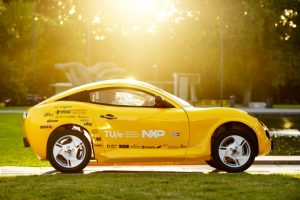
New project to build lightweight car from recycled PET composite material
Canadian Plastics
Automotive Research & Development SustainabilityThe project involved using more than 20 square meters of recycled PET honeycomb cores.

Photo Credit: Bart van Overbeeke
Thermoplastic honeycomb material developer EconCore has partnered with the TU/ecomotive team at Eindhoven University of Technology in the Netherlands to build a car made entirely out of recycled materials.
The concept car is a lightweight, electric vehicle designed and built by students, with the goal of showing that waste can be a valuable resource, while gaining business, engineering, and manufacturing skills and experience.
The project involved using more than 20 square meters of recycled PET honeycomb cores supplied by EconCore, which is headquartered in Leuven, Belgium. The whole chassis was made using the honeycomb core material, along with other areas such as the seat support structure, parts of the dashboard and the battery housing. After lamination of the composite skins, the strong, lightweight panels were used in most of the structural parts of the car. In addition to supplying the material, EconCore also provided technical advice and consulting services.
“The [TU/ecomotive] team asked for specific data and advice on how to optimally design and use the panels,” said Wouter Winant, technical manager at EconCore. “We carried out tensile tests on the composite materials and three-point bending tests on small panel samples, with different core thicknesses and skin materials. The mechanical data from these tests provided the optimum design of sandwich panel with the right balance between sustainability, weight, strength and stiffness.”
One of the challenges the TU/ecomotive team had was gluing the recycled PET core to a composite sheet consisting of flax fibres and a recycled polyolefin matrix contributed by other partners, the problem being that these two materials do not work well together when using adhesive. EconCore’s solution was to use a polyester non-woven fleece to cover the surface area of the honeycomb core. This is compatible with the adhesive and composite skin layers. A thin PET barrier film was used to ensure the adhesive glue did not flow through the fleece into the honeycomb cells, keeping the panel lightweight. All the materials were made of recycled PET, maintaining the aim of using recycled materials in a circular economy.
“What’s apparent to us, now the project is complete, is how the Luca car demonstrates just how versatile the recycled PET honeycomb core panels are, with the potential range of applications it can be used for – not just in automotive terms but in other industrial and consumer applications where strength, rigidity and light-weight are such important characteristics,” Winant said. “The potential is huge.”
Source: Eindhoven University of Technology
